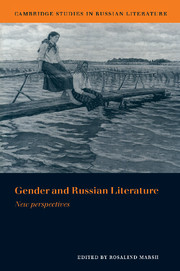Book contents
- Frontmatter
- Contents
- Notes on contributors
- Acknowledgements
- 1 Introduction: new perspectives on women and gender in Russian literature
- PART I HISTORICAL AND BIOGRAPHICAL PERSPECTIVES
- 2 Women in seventeenth-century Russian literature
- 3 Conflicts over gender and status in early nineteenth-century Russian literature: the case of Anna Bunina and her poem Padenie Faetona
- 4 Reading the future: women and fortune-telling in Russia (1770–1840)
- 5 Russian women writers of the nineteenth century
- 6 The ‘woman question’ of the 1860s, and the ambiguity of the ‘learned woman’
- 7 Carving out a career: women prose writers, 1885–1917, the biographical background
- 8 The fate of women writers in literature at the beginning of the twentieth century: ‘A. Mirè’, Anna Mar, Lidiia Zinov′eva-Annibal
- 9 Lidiia Zinov′eva-Annibal's The Singing Ass: a woman's view of men and Eros
- 10 Anastasiia Verbitskaia reconsidered
- 11 Soviet woman of the 1980s: self-portrait in poetry
- PART II THE PERSPECTIVE OF LITERARY CRITICISM
- Index
- CAMBRIDGE STUDIES IN RUSSIAN LITERATURE
10 - Anastasiia Verbitskaia reconsidered
Published online by Cambridge University Press: 06 July 2010
- Frontmatter
- Contents
- Notes on contributors
- Acknowledgements
- 1 Introduction: new perspectives on women and gender in Russian literature
- PART I HISTORICAL AND BIOGRAPHICAL PERSPECTIVES
- 2 Women in seventeenth-century Russian literature
- 3 Conflicts over gender and status in early nineteenth-century Russian literature: the case of Anna Bunina and her poem Padenie Faetona
- 4 Reading the future: women and fortune-telling in Russia (1770–1840)
- 5 Russian women writers of the nineteenth century
- 6 The ‘woman question’ of the 1860s, and the ambiguity of the ‘learned woman’
- 7 Carving out a career: women prose writers, 1885–1917, the biographical background
- 8 The fate of women writers in literature at the beginning of the twentieth century: ‘A. Mirè’, Anna Mar, Lidiia Zinov′eva-Annibal
- 9 Lidiia Zinov′eva-Annibal's The Singing Ass: a woman's view of men and Eros
- 10 Anastasiia Verbitskaia reconsidered
- 11 Soviet woman of the 1980s: self-portrait in poetry
- PART II THE PERSPECTIVE OF LITERARY CRITICISM
- Index
- CAMBRIDGE STUDIES IN RUSSIAN LITERATURE
Summary
At first sight, Anastasiia Verbitskaia (1861–1928) seems an unlikely candidate for rehabilitation. If she is mentioned at all in histories of Russian literature, she usually receives a critical reference as an exponent of ‘women's prose’ (zhenskaia proza), which has been characterized by both contemporary and later critics, in Russia and the West, as a literature of trivial or sensational themes, obsessed by sentiment and romance, and couched in a weak or hysterical style. In recent years, historians of Russian women's fiction have also generally accepted this view, arguing, for example, that ‘The prose of Anastasiia Verbitskaia at the turn of the century made the term “women's prose” derogatory.’ Why is it worth revisiting such a seemingly unpromising subject?
There are several good reasons for taking a fresh look at Verbitskaia's work. The first, general point is that a reassessment of Verbitskaia will contribute to the valuable feminist project of rediscovering and reinterpreting the lives and work of neglected Russian women writers, which is still in its infancy in comparison with the reclamation of English and American women's fiction initiated during the early stages of the secondwave feminist movement in the 1960s and 1970s. Like feminist writings in English from the 1880s onwards, Verbitskaia's novels played a progressive role in the Russian women's movement, even if they were not ‘great art’; and her activities as writer and publisher rendered her an important role model for Russian women and an influential popularizer of contemporary feminist ideas.
- Type
- Chapter
- Information
- Gender and Russian LiteratureNew Perspectives, pp. 184 - 205Publisher: Cambridge University PressPrint publication year: 1996
- 1
- Cited by

